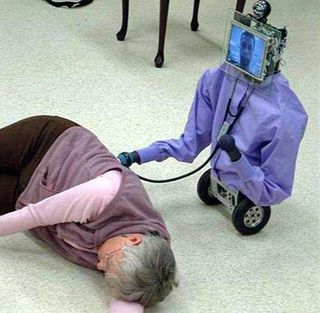Robots rising to the baby-boomer challenge
Could care-home robots help look after an ageing population?

Researchers from the University of Massachusetts (UMASS) in the US believe they may have come up with a solution to help relieve the pressure of having to care for an increasingly aged population – residential-home robots.
According to a report in LiveScience the robots are able to carry out a number of functions likely to be useful in such an environment, including picking up small objects, using a stethoscope, reminding patients to take their prescriptions and even dialling US emergency-services number, 911.
“For the first time, robots are safe enough and inexpensive enough to do meaningful work in a residential environment,” explains Rod Grupen from the UMASS team who’ve built the prototype.
The uBOT-5
Dubbed the uBOT-5 by the team who built it, each robot costs about $65,000 (£32,500) to build in the lab. However, Grupen believes those figures could be slashed to just a “couple of thousand” if the robots were to be mass produced in a dedicated factory.
If that’s the case then residential-home robots could end up paying for themselves within a month of deployment – especially given that a human equivalent can reportedly cost up to £1,500 (£750) to employ per week.
Better still, the uBOT-5 developed by UMASS can do more than just administer live-saving treatment – it’s also able to act as a ‘virtual’ house doctor by using its on-board camera, microphone, internet connection and touch-screen display.
Get daily insight, inspiration and deals in your inbox
Get the hottest deals available in your inbox plus news, reviews, opinion, analysis and more from the TechRadar team.
And as Grupen points out, on-baord internet access has other benefits too, such as enabling granny to receive virtual visits from her grandchildren from just about anywhere in the world.
